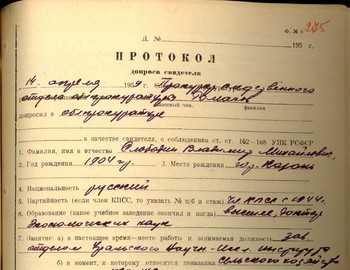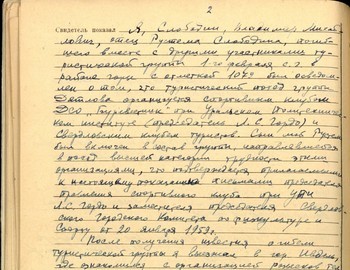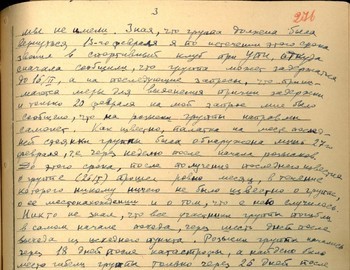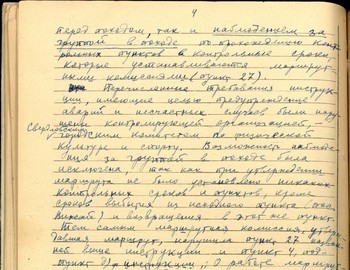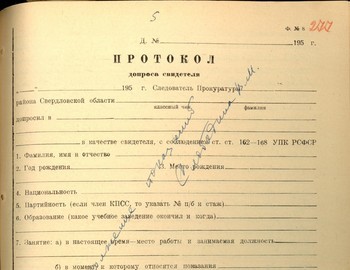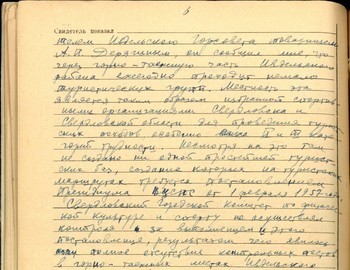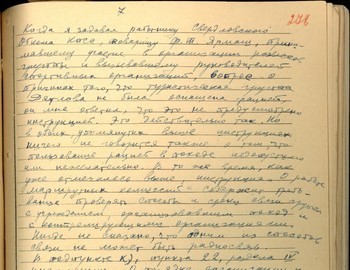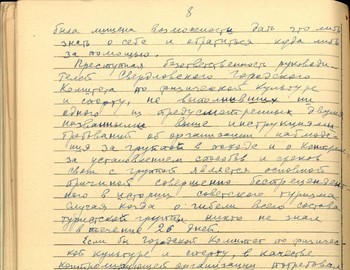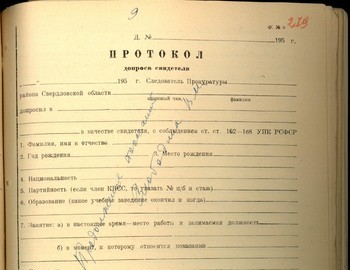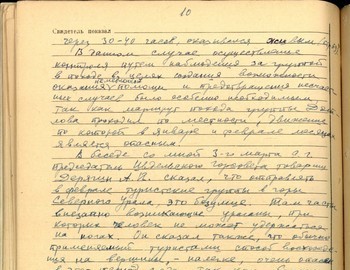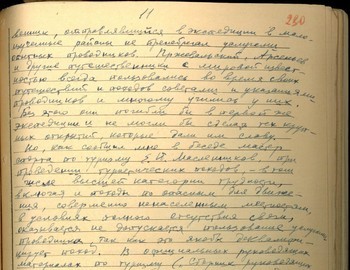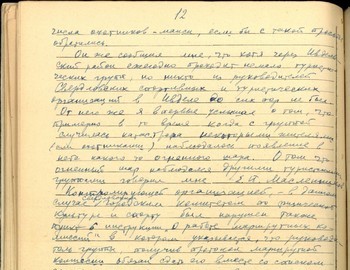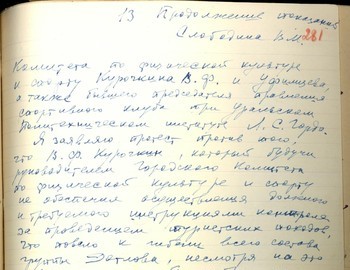
V.M. Slobodin witness testimony
Protocol
witness testimony
On 14 April 1959 the prosecutor criminologist of Sverdlovsk region Romanov interrogated as a witness District Prosecution Office, in compliance with Article 162-168 of the Code of Criminal Procedure of the RSFSR
- Surname, name and middle name: Slobodin Vladimir Mihaylovich
- Year of birth 1904
- Place of birth: city of Kazan
- Nationality: Russian
- Political affiliation: member of CPSU since 1944
- Education (which school graduated and when): Higher, Doctor of economics
- Occupation: a) currently (place of work and position): Head of Department of the Ural Scientific Research Institute of Agriculture
b) at the time to which the testimony refers: the same - Criminal record: no
- Permanent residence (exact address and telephone number): Sverdlovsk, Malysheva 142, apт. 71, Work D-1-88-00 Ext.80
- Passport: not with me
- What is the relationship with the accused: -
Warned on the responsibility for the first part of Art. 92 of the Criminal Code of the RSFSR for refusing to testify and under Art. 95 Criminal Code of the RSFSR for giving knowingly false testimony. Signed.
- 2 -
Witness testified: I, Slobodin Vladimir Mikhaylovich, the father of Rustem Slobodin, who died along with other members of the hikers group on February 1st in the region of the mountain marked as 1079, was aware that the hiking trek of Dyatlov group was organized by the "Burevestnik" sports club at the Ural Polytechnic Institute (chairman L. S. Gordo) and the Sverdlovsk sports club. My son Rustem was in the group that set out to go on the highest category of difficulty by these organizations, as written in the letters by the chairman of the sports club at UPI L. S. Gordo and the deputy chairman of the Sverdlovsk city committee on physical culture and sport, attached to this testimony dated January 20, 1959 year.
After receiving the news of the death of the hikers group, I traveled to Ivdel, met with the organization of the search for the bodies of the dead hikers, and talked with the chairman of the Ivdel city council, Comrade Deryagin Aleksander Petrovich. Upon returning to Sverdlovsk, I spoke with E. P. Maslennikov, who led the search for the missing hikers group, familiarized myself in detail with the approved orders of the Chairman of the Committee on Physical Culture and Sports under the Council of Ministers of the USSR №136 of June 3, 1957 on the "About the organization and responsibilities of the organizers, managers and participants of treks" and "On the work of Route Commissions of tourism".
My son, Rustem, left Sverdlovsk to take part in the expedition on January 23, 1959, which we received from him a postcard sent from the village of Vizhay of the Ivdel district at 10 am on January 26. After that, we had no more news
- 3 -
from the group. Knowing that Dyatlov’s group had to return on February 13th, after this period I called the sports club at UPI, whence I was first told that the group could be delayed until 15/II, and for subsequent requests that measures were being taken to find out the reasons for the delay and only on February 20 I was informed to my request that a plane was sent to search for the group. As is known, the tent at the site of the last overnight of the group was discovered only on February 27th i. e. a week after the start of the search. Before this date, after receiving the last news of the group (26/I), exactly one month passed during which no one knew anything about the group, its location and what had happened to them. Nobody knew that all the members of the group died at the very beginning of the hike, six days after leaving the starting point. The search for the group began 18 days after the disaster, and the place of death was found only 26 days after the accident that caused the death. Obviously, with such a time frame and pace of carrying out measures to find the group, it was impossible to count on the provision of assistance and the rescue of any of its participants.
The instruction "About the organization and responsibilities of the organizers, managers and participants of treks" provides for the supervision of the preparation and conduct of treks. As indicated in paragraph 4, section I of the instruction, the control is carried out in order to improve the quality of the hikes and prevent accidents and incidents. The controlling organizations of expeditions II and III categories of difficulty are the municipal and higher organizations of physical culture and sports, as well as regional and higher organizations of State Security Service (section V, § 26). According to paragraph 25 of the same (V) section, the control is carried out as by checking the group
- 4 -
before the hike, and the supervision on the group on the hike for passing the checkpoints within the target dates established by the Route commissions (§ 27).
The listed in the instruction requirements for the purpose of preventing accidents and incidents were violated by the controlling organization, the Sverdlovsk City Committee for Physical Culture and Sport. There was no possibility of supervising the group movement, since the approval of the route did not set any deadlines and points, except for the starting point (vilagge of Vizhay) and returning to the same point. Thus, the route commission, asserting the route, violated paragraph 27 of the above instructions and paragraph 4, subparagraph d) of the instruction "On the work of Route Commissions of tourism", which obliges the route commission to check "the ways and terms of communication of the group with the institutions that organized the hike; control points and communication with regulatory organizations". The Sverdlovsk City Committee for Physical Culture and Sport did not fulfill its duties as the controlling organization, entrusted with it the instruction "About the organization and responsibilities of the organizers, managers and participants of treks" and allowed the trek to be conducted in violation of the requirements for the suprevision of the group in the trek by passing control points in control terms and use of other forms of communication. During my conversation with the chairman
- 5 -
Continuation of Slobodin V. M. testimony
- 6 -
of the Ivdel City Council comrade A. P. Deryagin, he informed me that many hikers groups annually pass through the mountain-taiga part of Ivdel district. This area is thus chosen by sports organizations of Sverdlovsk and the Sverdlovsk region for treks, especially above the II and III categories of difficulty. Despite this, there is not a single simple sports base on trek routes required with a decree of the Presidium of the All-Union Central Council of Trade Unions on February 1, 1957. The Sverdlovsk City Committee for Physical Culture and Sport did not supervise the implementation of this decree, which resulted in the complete absence of control posts in the mountain and taiga places of the Ivdel district, which made it impossible to monitor the group during the checkpoint on passing control points in the control periods.
Under such unfavorable conditions, the controlling organization was obliged to demand that the hikers group be provided with other types and means of communication, which is stipulated by clause 4, subparagraph e) of the instruction "On the work of Route Commissions of tourism". In this case, there were other alternatives. Three of the participants of the trek, including the leader of Dyatlov group, were senior students of the radio engineering faculty of the Ural Polytechnic Institute, for whom using the radio transmitter on the trip would be good practice and which the faculty could probably provide a radio transmitter.
- 7 -
When I asked an employee of the Sverdlovsk Regional Party Committee, Comrade F. T. Yarmash, who took part in organizing the search for the group and called the leaders of sports organizations, the question of the reasons why Dyatlov hikers group was not equipped with a radio transmitter, he replied that it was not provided for by the instruction. This is true. But in both of the above-mentioned instructions, nothing is said either about whether using the radio during a hike is unacceptable or not recommended. At the same time, as noted above, the instruction "On the work of Route Commissions of tourism" contains a requirement to check the methods and terms of communication of the group with the institution that organized the trek and with the controlling organizations. Nowhere is said that radio communication cannot be one of the methods of communication.
Subparagraph (k) of paragraph 22, section IV of the instruction "About the organization and responsibilities of the organizers, managers and participants of treks" states that, to obtain permission to hike, among other materials is the information on the organization of security along the route, as well as where the group can ask for help if it proves necessary.
In this case, the Sverdlovsk City Committee for Physical Culture and Sport did not monitor the implementation of this instruction requirement. In the absence of checkpoints, points and any refuge along the entire length of the route, in the absence of radio communication, and any other means and methods of communication, the group
- 8 -
was deprived of the opportunity to transmit anything about themseves and call for help. The criminal irresponsibility of the leaders of the Sverdlovsk City Committee for Physical Culture and Sport, who did not fulfill any of the requirements for organizing and supervision the group on the hike and monitoring the establishment of methods and deadlines for communication with the group, is the main cause of something completely unprecedented in the history of Soviet tourism. a case when nobody knew about the death of the entire hikers group for 26 days.
If the city Committee for Physical Culture and Sport, as a controlling organization, demanded that Dyatlov group be equipped with radio communication, due to the lack of opportunities in this case to use other methods of communication, then it would be possible to monitor the group on the trek, its location would always be known report the incident or, if it were not able to do this, the communication break would have served as a signal of trouble with the group, as a result of which immediate actions could be undertaken, people could be found, extracted from under the snow, and one could still count on at least some of them being rescued. In the book of V. V. Dobkovich "Ski tourism" (1958) it is said that there are cases when a person is rescued from under the snow
- 9 -
Continuation of Slobodin V. M. testimony
- 10 -
after 30-40 hours, it turned out to be alive (p. 59). In this case, exercising control by observing the group on the hike in order to make possible of providing immediate assistance and preventing accidents was especially necessary, since the Dyatlov group's hike route went through the terrain, the movement along which in January and February is dangerous.
On March 3rd when I talked to comrade A. P. Deryagin, Chairman of the Ivdel City Council, he said that sending hikers groups to the mountains of the Northern Urals in February is insane. There are frequent sudden hurricanes, in which a person cannot stand on his feet. He also said that the way of climbing to the summits, which is commonly used by hikers, - light packed, is very dangerous during this period of the year, as the storms can suddenly appear out of nowhere and then the mountains are treacherous. Local Mansi hunters rush to take refuge in the taiga at the first signs of an approaching storm.
In the absence of any possibility of control by observing the group on the hike, when there are no control points of contact with the group, as was the case in this hike, it would be very important for the participants of the expedition to be able to use the advice of an experienced person who knows these forests well and could recognize the first signs of an approaching storm and choose the safest place to stop when the storm hits. Such advice could be provided by experienced guide. It is known that well established travelers
- 11 -
used the services of experienced guides in all big expeditions especially when trekking areas only known to locals. Przhevalsky, Arsenyev and other world-famous travelers always used tips and instructions from guides and learned a lot from them during their treks and trips. Without this, they would have perished on the very first expedition and could not have made those major discoveries that made them famous.
Alas, as E. I. Maslennikov, the master of sports in tourism, told me, during their expeditions, including the highest category of difficulty, when hiking in dangerous for trekking completely uninhabited areas, in conditions of complete lack of communication, it turns out that the hikers were not allowed to use the services of a guide, as it allegedly disqualifies the hike. In the official tourism guidelines ("Collection of Tourism Guidance Materials", 1958), I couldn't find indications that hikers groups are not allowed to use the services of a guide. If such instructions were given by anyone other than official materials and using the services of a guide is forbidden even when hiking in dangerous uninhabited areas with complete lack of communication, then this can only be regarded as a manifestation of adventurism in organizing hiking trips inherent in capitalist countries with characteristic disregard for people's lives and the pursuit of sensations without regard to the victims safety, but it is completely not characteristic of the Soviet system, one of the basic principles of which is to take care of people.
In a conversation with me, the chairman of the Ivdel City Council, A. P. Deryagin, said that the City Council could recommend to the group an experienced guide from
- 12 -
the numbers of the Mansi hunters if such a request were made.
He also informed me that although many hikers groups annually pass through Ivdel district, none of the leaders of the Sverdlovsk sports and hikers organizations have so far been in Ivdel. I first heard from him that about the time when the group went missing, Mansi (or hunters) witnessed a fireball appear in the sky. E. P. Maslennikov told me that a fireball was observed by other hikers groups.
The controlling organization, in this case, the Sverdlovsk City Committee for Physical Culture and Sport, also violated clause 6 of the instruction "On the work of Route Commissions of tourism", which states that, having received the protocol of the route commission, the group leader must pass it along with the route and list of the members of the group to an organization entrusted with the supervision of the preparation and conduct of the expedition, which only after that has the right to issue him the route itinerary. The Sverdlovsk City Committee for Physical Culture and Sport did not fulfill this requirement and allowed the group to go ahead, although the leader I. Dyatlov did not submit the route plan. As a result, when the group did not return and it was necessary to begin searching neither the City Committee nor the sports club of the Polytechnic Institute had knowledge of the the route of the expedition. Colonel Ortyukov, who flew out on the search for the group, received a route map that happened to be in R. S. Kolevatova, the sister of one of the participants in the expedition.
Based on the above, I, having lost my son as a result of the irresponsible organization of the hike, in violation of the rules and requirements of control and monitoring of the group on the hike, demand to bring to justice the leaders of the Sverdlovsk City
- 13 -
Continue reading
Slobodin V. M.
Committee on Physical Culture and Sports Kurochkin V. F. and Ufimtsev, as well as the former chairman of the board of the sports club at the Ural Polytechnic Institute L. S. Gordo.
I declare a protest against V. F. Kurochkin, who, being the head of the City Committee for Physical Culture and Sports, did not ensure the proper and required instructions for monitoring treks, which led to the death of the entire Dyatlov group, who despite this on March 26 was elected at the First City Constituent Conference of the Union of Sports Societies in the City of Sverdlovsk as Chairman of the Presidium of the Council of the Union.
V. Slobodin (signature)
Prosecutor of the Investigation Department
Signature

